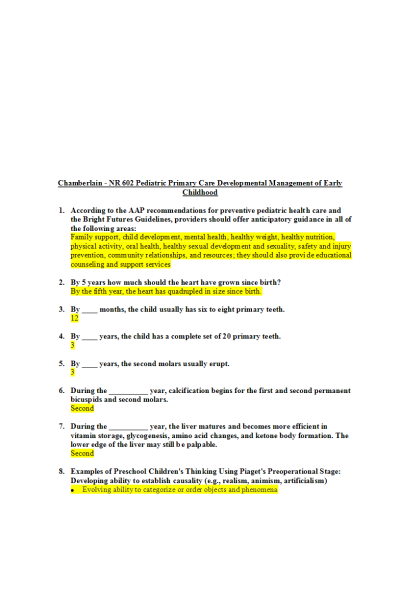NR 602 Week 1 Reading: Burns: Chapter 6: Developmental Management of Early Childhood - TESTBANK
-
$55.00
1. Question: According to the AAP recommendations for preventive pediatric health care and the Bright Futures Guidelines, providers should offer anticipatory guidance in all of the following areas:
2. Question: By 5 years how much should the heart have grown since birth?
3. Question: By ____ months, the child usually has six to eight primary teeth.
4. Question: By ____ years, the child has a complete set of 20 primary teeth.
5. Question: By ____ years, the second molars usually erupt.
6. Question: During the __________ year, calcification begins for the first and second permanent bicuspids and second molars.
7. Question: During the __________ year, the liver matures and becomes more efficient in vitamin storage, glycogenesis, amino acid changes, and ketone body formation. The lower edge of the liver may still be palpable.
8. Question: Examples of Preschool Children's Thinking Using Piaget's Preoperational Stage: Developing ability to establish causality (e.g., realism, animism, artificialism)
9. Question: Examples of Preschool Children's Thinking Using Piaget's Preoperational Stage: Developing sense of conservation of quantity, weight, mass
10. Question: Examples of Preschool Children's Thinking Using Piaget's Preoperational Stage: Developing sense of space: From experiencing space as a part of their activity to moving through it to understanding space in terms of detail and direction
11. Question: Examples of Preschool Children's Thinking Using Piaget's Preoperational Stage: Egocentrism
12. Question: Examples of Preschool Children's Thinking Using Piaget's Preoperational Stage: Evolving ability to categorize or order objects and phenomena
13. Question: Examples of Preschool Children's Thinking Using Piaget's Preoperational Stage: Incomplete understanding of sequence of time
14. Question: Examples of Preschool Children's Thinking Using Piaget's Preoperational Stage:Mental symbolization of the environment
15. Question: Examples of Preschool Children's Thinking Using Piaget's Preoperational Stage: Rigidity
16. Question: Examples of Preschool Children's Thinking Using Piaget's Preoperational Stage: Transductive reasoning: from particular to particular
17. Question: Examples of Preschool Children's Thinking Using Piaget's Preoperational Stage: Unable to see another's viewpoint
18. Question: Expressive Language: 12-18m
19. Question: Expressive Language: 18-24m
20. Question: Expressive Language: 24-30m
21. Question: Expressive Language: 30-36m
22. Question: Expressive Language: 36-42m
23. Question: Expressive Language: 42-48m
24. Question: Expressive Language: 48-60m
25. Question: Fine Motor Skills: 12m
26. Question: Fine Motor Skills: 15m
27. Question: Fine Motor Skills: 18m
28. Question: Fine Motor Skills: 24m
29. Question: Fine Motor Skills: 30m
30. Question: Fine Motor Skills: 36m
31. Question: Fine Motor Skills: 48m
32. Question: Fine Motor Skills: 60m
33. Question: Gross Motor Skills: 12m
34. Question: Gross Motor Skills: 15m
35. Question: Gross Motor Skills: 18m
36. Question: Gross Motor Skills: 24m
37. Question: Gross Motor Skills: 30m
38. Question: Gross Motor Skills: 36m
39. Question: Gross Motor Skills: 48m
40. Question: Gross Motor Skills: 60m
41. Question: How long should a child have abdominal respiratory movements?
42. Question: How much urine does a 2 year old excrete?
43. Question: Lexicon
44. Question: Mastery of which skills are necessary for language development?
45. Question: Receptive Language: 12-18m











/Pediatric Primary Care (Self Made)-80x80.png)
/Advanced Practice Nursing-80x80.png)



















